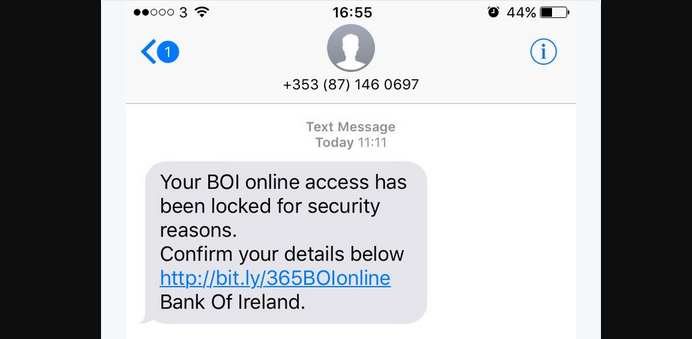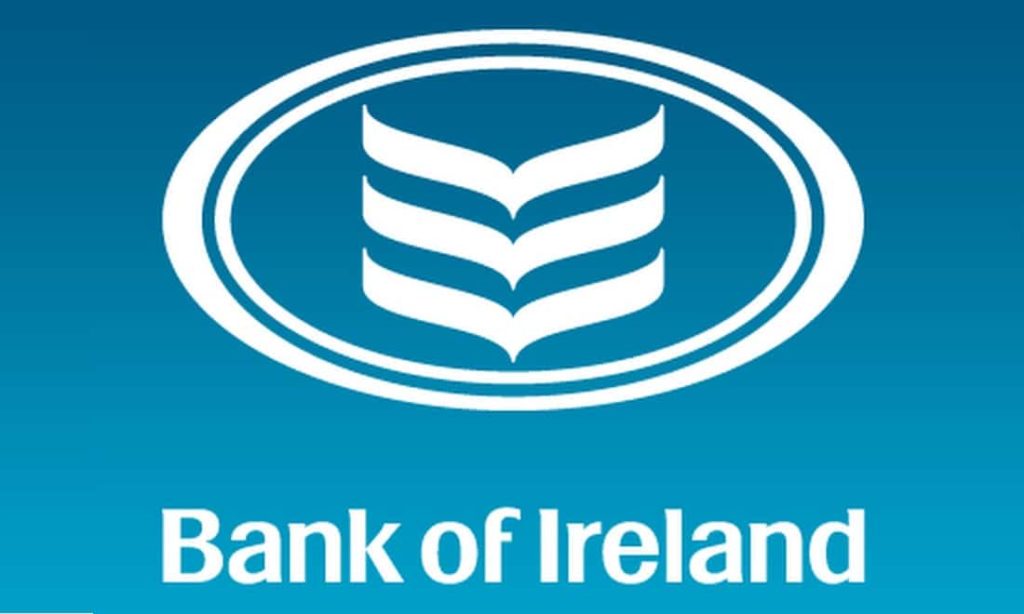How The Scam Works:
The Bank of Ireland warns their customers that someone is trying to get their money by sending out fake text messages. Several customers have reported themselves as a target for this scam.
The text falsely notifies customers that they have been locked out of their online account due to security reasons. The text message includes a link informing them to confirm their information and to regain access. How does the scam work?
Scam Detectors Most Trusted Websites in Online Security
- Guard.io (100): Surf the web safely. Clean up your browser, remove maliscious extensions and check for privacy violations.
- Incogni.com (100): Delete your personal data from the internet and protect against scams and identity theft.
- ExpressVPN (100) Stay secure and anonymous online - Best VPN Out There
- IPVansish (100) Fast VPN to stay safe and secure online with multiple discount plans.
Bank of Ireland was contacted by many of their customers through Twitter to notify them of the text message they had received. They responded by advising them not to click the link as it may contain malware. They also advised the customers to delete the text messages that they had received.
Typically, scammers use a malicious malware software in attempt to gather personal information that is store on a person's phone. If the link it clicked, then you may be granting access of your personal information to the scammer.
How To Avoid The Bank Of Ireland Text Message Scam:
Do not click the link. This is a phishing scam. It is important to keep your personal information secure and confidential. Usually these phishing scams appear in the form of an email or a text message. They appear to represent a legitimate company and try to obtain personal and confidential account information from you.
They lead you to believe that they indeed represent the company, while in reality they are actually conducting illegal transactions on your account.

Bank of Ireland will never send you emails that request for personal information. Any time you receive a request from the Bank of Ireland via email or a website, you should automatically consider it to be fraudulent and you should report it immediately. Your email address or phone number can be obtained from a public domain or through a randomly generated list.
Therefore, just because you have received this fake email does not mean that your name, email address or any other information has been gathered from Bank of Ireland's system. Fake emails will contain fake information, but often the use collected data that is legitimate to trick you even more.
For example, the email address and the webpage may be fake, but they may list the company's legitimate phone number (and real employees' names) within the email. They do this in attempt to make it look real.
Bank Of Ireland Tips To Follow:
Regardless, do not attempt to contact them by any of the information provided within the email. To ensure that you are always logging into the real Bank of Ireland's webpage, follow these tips:
1.Do not tell anyone your password, even if it is someone you may trust. Just remember that you are the only one held responsible when any action is taken by using your user identification and password.
2.Consider activating your pop-up blocker. Although some browsers activate this feature by default, not all of them do. Sometimes scams appear as a pop-up.
3.Don't disclose your personal information online unless you are 100% sure that it is a secure website.
4.Ensure that you have a licensed anti-virus software and that it is the most recently updated version.
5.Always be sure to logout and close your web browser each time that you access the Bank of Ireland account page.
6.Ensure that the operating system and the software installed on your computer is up to date and properly configured.
7.Consider installing a personal firewall.
8. Do not open any email that you are unsure of, especially any attachments that are affiliated with it. Be sure that you recognize the sender before opening an email.
9.Verify that a browser is secure prior to entering any personal information in the open fields. Also, ensure the web page offers encryption of your data. You can verify this by checking to see if you see a lock symbol in the lower right hand corner of the browser window.
How To Report The Bank Of Ireland Text Message Scam:
If you suspect that you have been a victim of fraud then call the Bank of Ireland immediately. If you receive an email or pop-up that appears to be fraudulent, do not hesitate to contact the help desk at Bank of Ireland. You can also reach them via email at [email protected].
You also want to ensure that you are monitoring your accounts on a regular basis, just in case. If you see anything that appears to be suspicious, any transfers that you did not authorize, or any other type of charge that you did not authorize, then contact them immediately.
One of the best ways to detect fraudulent activities on your account quickly is by reviewing your account history every day. Although just reviewing it will not prevent it from happening, it can ensure that the scammer is caught sooner. The sooner that they are found then the less people they can target.
Also, this will prevent them from making any other fraudulent charges on your account.
How To Protect Yourself More:
If you want to be the first to find out the most notorious scams every week, feel free to subscribe to the Scam Detector newsletter here. You'll receive periodical emails and we promise not to spam. Last but not least, use the Comments section below to expose other scammers.
Verify a website below
Are you just about to make a purchase online? See if the website is legit with our validator:
vldtr®


TOP 4 MUST-WATCH FRAUD PREVENTION VIDEOS
1. Top 5 Amazon Scams in 2024 2. Top 5 PayPal Scams in 2024 3. How To Spot a Scam Email in 2024
- Latest Posts by Selma Hrynchuk
-
Compromised Credit Card Scam
- -
Fake Google Chrome Update
- -
Facebook Privacy Notice Hoax
- All Posts













